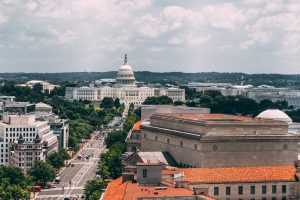Georgetown’s Counseling and Psychiatric Services (CAPS) announced a new resource, HoyaWell, in an effort to address the community’s mental health needs amid the ongoing COVID-19 pandemic. Some mental health advocates, however, say gaps remain that the university must address as it faces another semester of virtual learning.
Since March 29 of last year, students have been largely cut off from on-campus mental health resources while spread across the globe. Clinician licensing requirements vary by state, so CAPS staff members were unable to provide care outside of the states in which they are licensed. While some states made temporary provisions for medical professionals, these short-term solutions ceased by the end of the fall 2020 semester.
A GUSA survey last semester revealed 96 percent of student respondents demonstrated an increased desire to seek professional mental health services. Increased demand coincided with a lack of access, and 36.7 percent of respondents said COVID-19 significantly negatively impacted their ability to seek psychological and emotional help.
In response, the HoyaWell platform aims to provide around-the-clock telehealth services to students on a larger scale through video or call virtual sessions.
“These services are meant to support our students either for mental health issues, or if a student wants to check in more regularly to promote their emotional wellness. No issue is too big or too small,” a university spokesperson wrote in an email to the Voice.
In partnership with TimelyMD, the platform offers immediate access in critical circumstances, regular counseling visits, and psychiatry consultations to all Georgetown students in degree-conferring programs within the United States.
While HoyaWell alleviates the issue of regional licensing, it does not provide greater accessibility to international students and suffers similar shortfalls to the on-campus CAPS care model.
The first 12 sessions of scheduled counseling through HoyaWell are free, but each subsequent visit costs $79, potentially posing an insurmountable barrier to the most financially vulnerable Georgetown students.
“We’re glad at least that the first 12 sessions are free, but we do need other options,” GUSA mental health policy chair Sonya Hu (COL’22) said. Students may apply for a stipend from the student mental health fund, though it too is a stopgap measure, and the future of the fund itself is not assured. Hu also raised a continuity issue, adding, “The biggest problem with any college-oriented therapy program is that it’s intended to end when you graduate, which is really difficult for students because finding a therapist is challenging.”
An additional area students hope to address is the lack of clinicians of color and those with a range of gender identities and sexual orientations. Following the Black Survivors Coalition’s call for more suitable mental health services, the university worked out contracts with mental health providers who specialize in serving marginalized communities, including LGBTQ+ students and students of color.
While sessions with the BSC-negotiated mental health providers are free of charge and mark a step forward in mental health care, the counselors are largely within D.C. and not widely available to the student body under licensing laws. These services are also set to expire at the end of the 2020-2021 academic year.
As the university continues to adapt its services to better care for students in a virtual environment, there services that would provide benefit even as the community returns to campus. Hu said, “I certainly hope we keep HoyaWell as a mental health service once we go back in-person, and also continue looking for other ways to expand our mental health resources.”






[…] Source Article […]